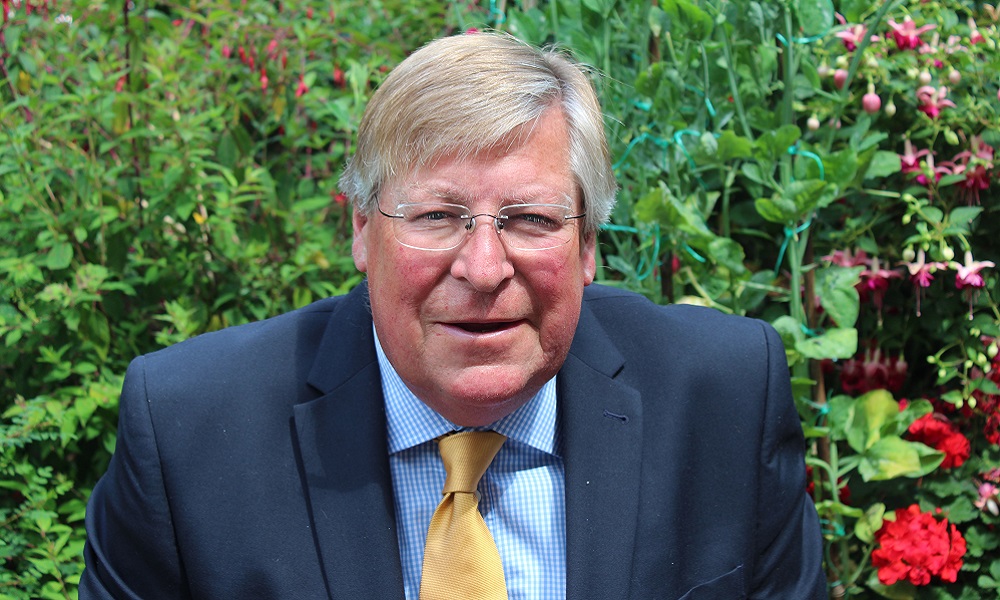
Ed Stourton Interview
Ed Stourton Interview
As he heads to Clapham Book Festival in October, Julie Anderson talks to legendary broadcaster Ed Stourton about his incredible career
‘When we saw the UN convoy, we realised immediately that it might be our way into Sarajevo,’ says Ed Stourton, broadcaster and journalist, as we sit in his delightful south London garden. ‘Within minutes we had thrown all our gear back into the truck and had tagged on, hoping to be mistaken for UN personnel. That was how ITN was able to broadcast from inside the besieged city. Unfortunately, we left our hotel in such haste that we’d scooped up someone’s luggage as well as our equipment and we found an extra suitcase in our truck. It belonged to a citrus fruit grower from Macedonia who was, one assumes, wandering around Sofia looking for his lost belongings.’
Stourton has been witness to more than one war zone in a long career. ‘The Bosnian War changed how large news organisations covered wars,’ he says. ‘It was the first time, in my experience, that journalists were deliberately targeted by combatants because they were journalists.’
PARIS AND LONDON
He was Channel 4 correspondent in Washington and BBC correspondent in Paris, as well as being one of the founders of Channel 4 News. ‘Washington was a lovely city,’ he says. ‘Gentle and friendly. Paris was very smart and socially self-aware. Many journalistic values were shared, although the French were much more respectful of the holders of high office. President Mitterand’s Elysee Palace press conferences were always received with quiet respect, difficult questions were not asked, whereas journalists in the US, like those in the UK, took pride in being bolshie and awkward.’
Now Stourton has a home in France. He spent much of his childhood in Switzerland, so picked up the language early. The farmhouse in the foothills of the Pyrenees, very much La France Profonde, provides a contrast to his life in London. The region featured in ‘Cruel Crossing: Escaping Hitler Across the Pyrenees’ – his book about the Chemin de la Libertié, the escape route across the mountains. The book was much praised for bringing human stories to life.
JOURNALISTIC INTEGRITY
His take on current journalism in the world of 24-hour news, niche broadcasters, fakery and ‘alternative facts’ is an interesting one. ‘The BBC has always attracted criticism from across the political spectrum. That was the case in 1939, there was the usual traffic, complaints and arguments, but that all stopped in May 1940 when Churchill formed his coalition government. When the country is united in a common purpose, it’s easier being the BBC. More recently, this administration’s ‘ban’ on ministers speaking to Radio 4’s Today programme quickly collapsed once the COVID pandemic struck.’ Nonetheless, he considers that there is greater pressure than ever, feeding through from the government.
He spent a lot of time in the archives researching “Auntie’s War; the BBC During the Second World War”, studying Nazi propaganda as well as the BBC’s own internal documents. ‘In that instance, truth-telling, as opposed to lies, became a useful weapon of war,’ he says. ‘Everyone listened to the BBC, knowing that they would get the truth of things, especially in occupied Europe. The British government realised that this was hugely in their favour.’ The BBC’s international reputation was made.
LOVE FOR RADIO
Stourton freely admits that he is in love with radio – he presented Radio 4’s Today Programme for a decade and he is now part of the presenter line-up on The World at One and The World This Weekend. He is the main presenter of Sunday, a look at the ethical and religious issues of the week. ‘As the old joke has it, the pictures are better on radio,’ he says. ‘For drama of live images, TV is incomparable, but its storytelling is linear. Radio gives space and time. There is greater flexibility to delve deeper and in a more wide-ranging way.’
There have been plenty of history-making moments at which Stourton has been present. He was in Red Square the night the Soviet flag was lowered from over the Kremlin, in Soweto when Nelson Mandela was released and in Berlin when Checkpoint Charlie, the old border crossing and scene of so many spy stories and films, was finally dismantled.
And that suitcase in Sarajevo, was it returned to its owner? ‘Yes, eventually. It caused us something of a dilemma, because the hotel where we and the Macedonian had been staying was, we learned once we’d checked in, also a brothel. We weren’t sure if his family knew that he was saying in such a place. Who knows if they found out?’






